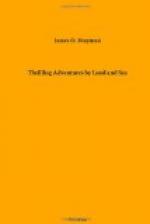After sending the servant a second time, he came back with the announcement that the Agha would examine their baggage, take what he pleased, and send them on to another Agha; but would not allow them to return to Mosul.
This examination was soon made, and the party was plundered of one thousand piasters, (forty-four dollars,) besides razors, knives, and a quantity of clothing.
The whole affair was conducted with a politeness of manner which was highly creditable to the Agha, and calculated to put us very much at our ease. He showed himself, in every thing,
——“As
mild a mannered man
As ever scuttled ship,
or cut a throat”
For instance, in searching our trunk, his eye was caught by a small, sealed parcel, which I supposed to contain jewelry; I immediately told him, through a servant, that it was not mine, but had been given to me, in America, to be delivered in Europe. He immediately put it down, and proceeded with the search.
“During these operations, several women, some from curiosity, others from pity, had gathered around us. Among the latter class, was one, who, from her dress, beauty, and demeanor, could be no other than the wife of the Agha. She was dressed in a faded, but once magnificent robe, and trowsers of silk, and wore upon her head a massive and elaborately-carved ornament of silver. She moved among the fierce and blood-thirsty savages, with an air of mingled scorn and anxiety, reproaching them with the shame of the transaction, and pleading earnestly that our lives and property be spared. She warned them, also, that our injuries would inevitably be visited upon their heads.
“Having finished his search, the Agha, with the old men of the tribe, gathered on a ledge of rocks, just behind us, and consulted long and earnestly. We sat down and dined with what appetite we could muster.”
After the robbers had come to their decision, a second search of the baggage took place, which Mr. Bacon thus describes:
“The pressure of greater and more important dangers had made me quite resigned to such petty losses as these, and I watched, with much amusement, the appropriation of unusual articles. A black silk cravat which had seen much service in New Haven drawing-rooms, was twisted about the suspicious-looking head of an uncommonly dirty boy. A pair of heavy riding-boots were transferred to the shoulders of a youth who bore the ‘gallows mark’ upon his features with unmistakable distinctness. A satin vest of Mr. Marsh’s was circulating through the crowd, on the person of a dirty child, who boasted no other wealth but a ragged shirt and a green pomegranate. I looked at the youngster with a smile of congratulation; but he turned upon his heel and strutted gravely away, his new garment trailing on the ground at every step.




